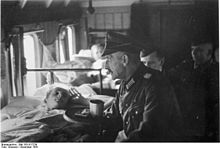Willy Peter Reese

Willy Peter Reese (born January 22, 1921 in Duisburg ; † very likely died between June 22 and 27, 1944 near Wizebsk in the Soviet Union ) was a German writer. During the Second World War , as a Wehrmacht soldier on the Eastern Front, he kept records of his experiences, which he edited in a manuscript. It was published in 2003 under the title Mirself strangely foreign .
youth
Willy Peter Reese attended the Mercator High School in Duisburg and graduated from high school in 1939. In his youth he was critical of National Socialism. The first literary attempts were made during this time, including working on an autobiography. During his time at high school Reese made friends with a classmate of Jewish faith who was later deported to Auschwitz and died there.
After finishing school, Reese started an apprenticeship at the Duisburger Bankverein. This happened mainly at the request of his father. The apprenticeship also gave Reese space for his writing activities.
War effort
In February 1941 he was drafted to Cologne-Mülheim for military training. His ministry began in August, first taking him to the Kiev area. From there he advanced east with his troops and took part in battles in the Kursk area. Reese was wounded in the process and in March 1942 was admitted to a military hospital in Offenbach.
Reese's next war mission in the east began in autumn 1942. He arrived in October in the Rzhev region , 200 kilometers northwest of Moscow. In February 1943 he was wounded again and transferred to Germany to recover.
From 1942 onwards, there are clearer traces of criticism of National Socialist society in Reese's writings. He also refused to participate in the training of newly drafted soldiers.
In July 1943 he had to return to the Eastern Front and participated in the unsuccessful summer offensive of the Wehrmacht. The Wehrmacht withdrew to the west, where Reese stayed in positions on the Dnieper River until early 1944. Reese probably fell in June 1944 near Vitebsk in northern Belarus.
During his leave from the front or during rehabilitation, Reese had written a preliminary manuscript at his parents' home in Duisburg on the basis of his notes, letters and memories. He gave it the title Russian Adventures - a commitment from the great war . In the hope of being able to publish his book, he wrote to several publishing houses during his military service, albeit without success.
estate
Between 1941 and 1944 Reese wrote several hundred poems, prose works and probably over a thousand letters. After the death of Reese's mother in the 1970s, his cousin Hannelore Kern inherited Reese's several thousand sheets of records. The box with these documents remained locked for a long time. It was not until years later that Hannelore Kern began to sort and read the disordered, often difficult to decipher pages. She copied all letters and manuscripts. In 2002, she began looking for an institution to archive Reese's writings in order to save them for posterity.
She wrote to universities and publishers, but rarely got an answer. It was only in cooperation with the Stern reporter Stephan Schmitz that the book Mir myself strangely foreign was created .
Individual evidence
- ↑ Stefan Schmitz (Ed.): Strangely foreign to myself . Berlin 2004. p. 268.
- ↑ Stefan Schmitz (Ed.): Strangely foreign to me myself . Berlin 2004. p. 235.
plant
- Willy Peter Reese: Strangely strange to myself. The inhumanity of war. Russia 1941-44. Edited by Stefan Schmitz. Claasen, Munich 2003, ISBN 3-546-00345-4 .
Web links
- Literature by and about Willy Peter Reese in the catalog of the German National Library
| personal data | |
|---|---|
| SURNAME | Reese, Willy Peter |
| BRIEF DESCRIPTION | German member of the Wehrmacht and author |
| DATE OF BIRTH | January 22, 1921 |
| PLACE OF BIRTH | Duisburg |
| DATE OF DEATH | after June 22, 1944 |
| Place of death | near Vitebsk |

